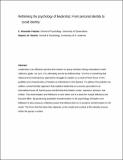Files in this item
Rethinking the psychology of leadership: from personal identity to social identity
Item metadata
| dc.contributor.author | Haslam, S. Alexander | |
| dc.contributor.author | Reicher, Stephen David | |
| dc.date.accessioned | 2016-04-29T16:30:04Z | |
| dc.date.available | 2016-04-29T16:30:04Z | |
| dc.date.issued | 2016-07-11 | |
| dc.identifier | 242240279 | |
| dc.identifier | cdf0af70-a6fb-4d63-b8dd-bf2319d1dc73 | |
| dc.identifier | 84978395290 | |
| dc.identifier | 000380996300003 | |
| dc.identifier.citation | Haslam , S A & Reicher , S D 2016 , ' Rethinking the psychology of leadership: from personal identity to social identity ' , Daedelus, The Journal of the American Academy of Arts and Sciences , vol. 145 , no. 3 , pp. 21-34 . https://doi.org/10.1162/DAED_a_00394 | en |
| dc.identifier.uri | https://hdl.handle.net/10023/8707 | |
| dc.description.abstract | Leadership is an influence process that centers on group members being motivated to reach collective goals. As such, it is ultimately proved by followership. Yet this is something that classical and contemporary approaches struggle to explain as a result of their focus on the qualities and characteristics of leaders as individuals in the abstract. To address this problem we outline a social identity approach that explains leadership as a process grounded in an internalized sense of shared group membership that leaders create, represent, advance, and embed. This binds leaders and followers to each other and is a basis for mutual influence and focused effort. By producing qualitative transformation in the psychology of leaders and followers it also produces collective power that allows them to co-produce transformation in the world. The form that this takes then depends on the model and content of the identity around which the group is united. | |
| dc.format.extent | 315803 | |
| dc.language.iso | eng | |
| dc.relation.ispartof | Daedelus, The Journal of the American Academy of Arts and Sciences | en |
| dc.subject | BF Psychology | en |
| dc.subject | NDAS | en |
| dc.subject.lcc | BF | en |
| dc.title | Rethinking the psychology of leadership: from personal identity to social identity | en |
| dc.type | Journal article | en |
| dc.contributor.institution | University of St Andrews. School of Psychology and Neuroscience | en |
| dc.contributor.institution | University of St Andrews. St Andrews Sustainability Institute | en |
| dc.identifier.doi | https://doi.org/10.1162/DAED_a_00394 | |
| dc.description.status | Peer reviewed | en |
This item appears in the following Collection(s)
Items in the St Andrews Research Repository are protected by copyright, with all rights reserved, unless otherwise indicated.

